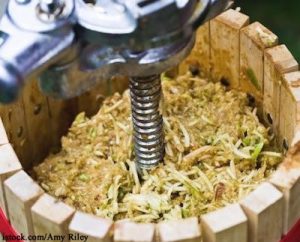Unpasteurized apple juice sold at High Hill Ranch in Camino, California has sickened at least seven people with E. coli infections, according to the El Dorado County Environmental Management and Public Health division. All of the patients live in Sacramento County and all consumed the product from the ranch in mid October this year.
 One person has been hospitalized and is expected to recover. The juice was consumed at home or at High Hill Ranch. Officials are warning consumers to not drink any unpasteurized apple juice purchased from the ranch on or after October 6, 2015.
One person has been hospitalized and is expected to recover. The juice was consumed at home or at High Hill Ranch. Officials are warning consumers to not drink any unpasteurized apple juice purchased from the ranch on or after October 6, 2015.
Unpasteurized apple juice, just like unpasteurized milk, has caused E. coli outbreaks in the past. An outbreak in Michigan in 2012 linked to unpasteurized juice sickened people. And an outbreak in Canada last year that sickened people with E. coli infections was linked to the unpasteurized beverage.
These products can be contaminated with E. coli bacteria and other pathogenic bacteria. Pasteurization destroys the bacteria in those products and makes them safe to drink. While the FDA requires that unpasteurized apple juice have a warning label that tells consumers about the risks of drinking that product, that warning is not required on juice that is freshly squeezed and served to the public at orchards, farmers markets, roadside stands, and in some restaurants or juice bars.
Noted food safety attorney Fred Pritzker believes that these standards should be changed. “All unpasteurized juice should be labeled with a warning telling consumers about the risks of consuming the product, no matter where it is sold,” he said.
E. coli bacteria can get onto apples in many different ways. Contaminated irrigation water, which may contain feces from factory farms, can contaminate the crop. Animals in the orchard, or improperly cleaned harvesting or transporting equipment may contaminate the fruit. Then when the fruit is processed into juice, the bacteria will be mixed throughout the product.
Unfortunately, the owners of High Hill Ranch put out a statement blaming consumers for this outbreak. They stated that since consumers touch the nozzle to fill the sample cups “this very well could have spread a virus to the sample jug.” They also state that they have been making juice for 50 years, and have not had any complaints.
E. coli bacteria are not viruses. Unpasteurized apple juice is a common source of the pathogenic bacteria. People who are sick with E. coli are usually not going to be well enough to visit a farm. And no companies or farms are immune to E. coli outbreaks, no matter how stringent their quality control.
The symptoms of an E. coli infection include diarrhea that is watery and/or bloody, severe abdominal cramps, vomiting, and a mild fever. The symptoms usually begin a few days after exposure to the pathogenic bacteria. Most people are sick enough that they visit a doctor when they contract this infection.
Going to the doctor is very important if you have these symptoms, because a misdiagnosis and treatment with an antibiotic can increase the risk of developing hemolytic uremic syndrome (HUS), a serious complication of a shiga toxin-producing E. coli infection. The symptoms of this complication include pale skin, easy bruising, little or no urine output, lethargy, and a skin rash. If anyone develops these symptoms, see a doctor immediately.
If you drank unpasteurized apple juice produced at High Hill Farm in California and have developed the symptoms of an E. coli food poisoning infection, see your doctor immediately. Early treatment and proper diagnosis is key to a full recovery.




